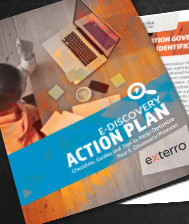By David Carns
Chief Strategy Officer of Casepoint
The story of legal technology over the past 30 years is by and large a story of tremendous progress. During that period there have been near-continual improvements, enabling significant gains in speed and efficiency, and lowering the headcount in many legal departments. But until recently the impact of these improvements has been felt primarily in the legal department itself. For the most part, legal continued to be perceived as just another department within the corporate structure, and rarely a strategic driver in the organization.
But recent advances in legal technology – in particular artificial intelligence technologies like analytics, predictive modeling and machine learning – are giving legal more prominence within the corporation and are helping make the department’s strategic value more tangible to the C-suite and the board. Let’s explore how these advanced analytic technologies are currently helping corporate legal departments elevate their standing and demonstrate they are at least as valuable as other corporate business units in managing profit and loss and informing strategic business decisions.
Yesterday’s technology creates new efficiencies, but is that enough?
Legal technology made significant improvements from the 1990s through 2010s by leveraging innovations like word processing, hard copy document scanning, electronic time capture, e-billing, and a broad range of e-discovery technologies, including web-based review and technology assisted review (TAR). The result of incorporating these and other innovations has been a much higher level of efficiency in legal departments.
In light of the paper-based alternatives of the 90s and earlier, the new efficiencies were dramatic. Word processing alone meant that fewer people were required to create memos, briefs, complaints, contracts and the like, and the addition of scanning and electronic time capture made possible huge gains in productivity for attorneys and legal staff. Even as technology opened the doors to exponential increases in data volume, e-discovery applications, web-based review and eventually TAR enabled case teams to pore through millions of digital pages with greater speed than it took to read thousands of physical pages just a few years earlier.
These were significant improvements, but for the most part they did not – and still fail to – resonate in the corporate boardroom. Why? Because legal departments remained predominantly reactionary rather than proactive. While these powerful new technologies allowed legal to manage current challenges with greater ease and with fewer employees, they did little to allow GCs to get ahead of future challenges. But that’s begun to change.
Today’s technologies provide unprecedented insight into current, and future, matters
More recent developments in legal technology – incorporating broader innovations like SaaS and cloud-computing, as well as machine learning, predictive modeling, data analysis and data visualization – are finally allowing legal departments to demonstrate proactive and strategic value to the board. The recent embrace of these innovations by general counsels and legal executives are part of a large trend in which the legal department is exerting much tighter control over eDiscovery technology. That’s happening because GCs understand it’s one of their best avenues to controlling costs. More importantly, the trend is providing the GC and other executives with the metrics they need to understand the precise relationships between cost and performance – not just in eDiscovery, but across the litigation lifecycle.
The power of analytics across multiple matters
These new technologies are realizing their fullest potential in multi-matter analytics and data reuse, in which information about data gleaned from one legal matter is leveraged and applied to the data in subsequent matters, and where analytic processes are tightly integrated across the entire litigation workflow. When advanced analytical technology is integrated across multiple legal matters, the legal department can identify key metrics to understand important trends outside the silo of individual matters. This is precisely where legal begins to transcend its traditional status and function in the organization and become a proactive participant in business strategy.
Machine learning, a key component of analytics, is all about continuous improvement. Machine learning algorithms are built to quickly detect patterns in large bodies of data. By repeatedly and iteratively generalizing from very specific examples, these algorithms steadily refine our understanding of the data and, as they are progressively exposed to even larger volumes of comparable data, are able to make increasingly accurate predictions about the kind of information a new body of data is likely to contain.
For instance, legal now has access to tools that can help them make accurate projections about important factors in eDiscovery like data volume, the number of individual documents, the document types, the number of custodians and the number of reviewers a particular matter is likely to involve. The same tools enable us to quickly make facts-based determinations on questions like these: Which outside counsel is making the most efficient and cost-effective use of technology? Which is likely to perform best on a particular kind of matter? Which reviewers were most effective and productive in Matter A? Which reviewers are likely to do the best job at the lowest cost on Matters B and C?
Analytic technology applied to a single matter – say, predictive coding to speed the review process – can be achieve big cost savings even in that comparatively narrow context, but the technology is especially powerful when you use it to leverage information from one litigated matter and apply that knowledge to additional matters.
For example, privileged documents from Matter A are highly likely to be privileged documents in Matter B. Finding those documents the first time around can be expensive and time-consuming – especially if you are relying on keyword searching – but machine learning can make that process many times faster and more accurate when you are leveraging a larger body of information from previous matters.
Similarly, “hot” documents in one matter are often likely to be informative across multiple matters. The sooner we identify such documents in the litigation lifecycle, the earlier we are able to make important decisions about whether to negotiate or proceed to trial, or about legal strategy – and, of course, this has the potential to save lots of money. The same dynamic applies to information about internal investigations: Analytics can help us quickly identify internal code words or project names tagged in previous investigations and predict their relevance to subsequent investigations. We can even use these metrics and processes to inform multiple matters simultaneously in real time. Suggested tagging from one matter can be applied to speed review in another matter being litigated at the same time.
Data-based portfolio management reduces costs across the board
When you consider the application of analytics across multiple matters, the result is something GCs haven’t had before: true portfolio management with a comprehensive view of costs, efficiencies and trends across all matters. You even have the components of high-level SWOT analysis right at your fingertips. As I’ve already suggested, this is the kind of information that earns legal a seat in the boardroom. Advanced analytics enables comprehensive, effective multi-matter management that will lead to reduced legal costs associated with litigation and reduced risk by improving legal outcomes.
Litigation cost forecasting based on multi-matter analytics is now possible and, properly applied, is much more accurate than less sophisticated forecasting methodologies. And the benefits can extend to other functions in the organization. For example, when the legal department successfully deploys analytics to overhaul its portfolio management processes, that deployment can serve as a model for corporate IT deployment in other departments and inform the organization at large about optimal technology strategies.
Does this kind of potential excite you? It should. Even if your organization chooses not to bring an advanced eDiscovery platform in-house, you should be demanding metrics from outside counsel and/or third-party vendors that can help you determine which outside counsel makes the most effective use of technology and which review teams are most cost-effective and achieve the best outcomes. Does your outside counsel take advantage of analytic tools like document classifiers, predictive coding, TAR 2.0 and advanced data modeling? If you don’t know, you should ask, and you should ask to see the data.
Analytics technology is no longer speculative in the legal domain. It is being used to great advantage in forward-looking law departments and firms right now. Technology platforms are being designed and developed specifically to accommodate a more rigorously proactive mindset in the legal department. These platforms not only incorporate advance technologies, but are also built for maximum extensibility and flexibility so they can be easily and rapidly customized and readily integrate new applications. There is little doubt they can efficiently automate the full spectrum of eDiscovery phases, but they are also giving legal departments a more holistic and data-driven view of the entire litigation process and providing the basis for strategic decision-making. That’s certainly good for legal, but it’s also good for the entire organization.
ABOUT THE AUTHOR
David Carns is the Chief Strategy Officer of Casepoint LLC. He joined Casepoint as a Director of Client Services in 2010, rose the ranks to Executive Vice President until his most recent promotion in 2017. In addition to being a recovering attorney, Carns possesses a lifelong passion for technology and its advancements. His career has always found him at the intersection of technology and the legal field given his intimate knowledge of both.
Prior to joining Casepoint, Carns’ positions included Director of Practice Technology at a premier global law firm, Technology Consultant, and Director of Technology. Carns holds a Juris Doctorate from The John Marshall Law School and a Bachelor’s degree in Philosophy from DePauw University.




